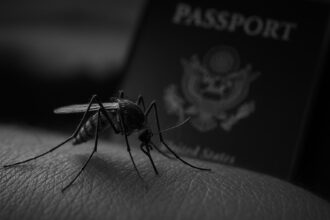David Clews and Mark Collett seek to embed radical far-right ideologies within a growing Scottish political party, raising alarm among anti-fascist campaigners and politicians about the party’s future and the broader implications for Scotland’s political landscape.
In recent months, a troubling trend has arisen within Scottish politics, as fringe elements are increasingly encroaching on established political frameworks. David Clews, a far-right influencer with a history of extremist affiliations, is spearheading efforts to entwine radical views with a growing political movement notorious for its anti-immigration stance. Clews, connected to the controversial Unity News Network—a platform known for conspiracy theories—aims to exploit the party’s recent electoral gains in England to further his agenda.
At a recent gathering for Patriotic Alternative, a group infamous for its neo-Nazi and white nationalist ideologies, Clews proclaimed his aim to transform the party from within, branding it as a “Trojan horse” for extremist ideologies. His collaboration with Mark Collett, a leader with a notorious past linked to the British National Party, indicates a strategic maneuver to slide far-right policies into the political mainstream under the guise of legitimacy. The call to arms by Clews for supporters to infiltrate the party underscores a calculated effort to embed their extremist agenda at the party’s core.
Anti-fascist campaigners have reacted promptly, urging the electorate to recognize the grave threat that such infiltration poses. Politicians like Kenny MacAskill of the Alba Party and Scottish Greens’ Patrick Harvie have voiced deep concerns about the attraction of far-right elements to this burgeoning political force. MacAskill underscored the dire consequences of allowing extremism to permeate mainstream discourse, suggesting that the veneer of reform serves as a mere facade for darker ambitions. Harvie echoed these views, characterizing the party as a vehicle for the personal interests of its leader while simultaneously drawing in extremist factions.
Clews and Collett’s ambitions extend beyond mere influence; they present an agenda that envisions radical policy shifts. Their proposals range from advocating mass deportations to dismantling environmental protections, marked by a stark departure from the centrist values that typically define political discourse. Collett’s stated intention to “drag the party to the right” amplifies concerns about the integrity of its platform, which has already faced scrutiny for harboring extremist elements.
Clews’ trajectory through various political affiliations—from Conservative to Labour and eventually to far-right circles—raises essential questions about credibility. His Unity News Network has morphed into a hub for conspiratorial and extremist ideologies, especially during the pandemic. Previous support for individuals like Stephen Lennon, a known far-right figure, further complicates his standing.
Financial motivations also underline Clews’ endeavors. Operating a subscription model for followers seeking access to his content, he claims these funds support his legal challenges related to his incendiary views. His historical difficulties in managing his platforms—such as disabling chat features due to rampant racist commentary—reflect the inherent challenges of controlling far-right narratives in digital spaces. Furthermore, his rhetoric surrounding ‘freedom of speech’ obscures a deeper undercurrent of intolerance that increasingly permeates certain political circles.
As this political commentary evolves, it becomes imperative that the party confronts the specter of extremism embodied by figures like Clews. While the movement has publicly distanced itself from far-right elements, claiming that “no one will infiltrate our party,” the challenge lies in effectively countering these ominous influences and safeguarding the democratic process against the insidious rise of extremist ideologies.
In light of these disturbing developments, it is essential for voters and political stakeholders in Scotland to remain vigilant. The alarming ease with which extremist narratives can infiltrate political discourse threatens the democratic values and social fabric of society. As this precarious situation unfolds, the responsibility will not only rest on established parties but also on civil society to fortify their stance against the encroachment of extremism, ensuring a political landscape that prioritizes inclusivity and authentic representation for all.
Source: Noah Wire Services
- https://www.dailyrecord.co.uk/news/scottish-news/scots-far-right-influencer-orchestrating-35241287 – Please view link – unable to able to access data
- https://hopenothate.org.uk/case-files-unity-news-network/ – This article provides an in-depth examination of Unity News Network (UNN), a conspiracy theory website led by David Clews, a former Conservative and Labour councillor in Renfrewshire, Scotland. Founded in 2018, UNN gained prominence by supporting the protest movement to free anti-Muslim extremist Stephen Lennon (also known as Tommy Robinson) during his imprisonment in 2018. The platform’s following expanded significantly after it began disseminating conspiratorial content related to the COVID-19 pandemic. As of the latest update, UNN boasts over 104,000 followers on Facebook, 90,000 on Twitter, and 21,000 on Telegram. Under Clews’ leadership, UNN has adopted an increasingly extreme outlook, promoting the White Genocide conspiracy theory and describing Western societies as being in the grip of ‘cultural Marxist degeneracy’. The article also highlights Clews’ close associations with the UK’s extreme right, including speaking at conferences of the neo-Nazi group Patriotic Alternative (PA) in 2022 and 2023. Additionally, UNN has hosted PA leaders on its streams, and its Telegram chat has been inundated with open antisemitism, racism, and support for Hitler. The piece concludes by noting Clews’ descent into paranoia, exemplified by his claim that ‘Hope Not Hate have now taken over Number 10 Downing Street. A Bolshevik coup is taking place.’
- https://www.dailyrecord.co.uk/news/scottish-news/former-scots-tory-councillor-emerged-31422962 – This article discusses the emergence of David Clews, a former Conservative councillor in Renfrewshire, as a leading influencer for the far-right group Patriotic Alternative (PA). After leaving the Conservative Party, Clews formed a splinter group called UK Unity, which later led to the creation of Unity News Network (UNN). UNN draws together ultra-right-wing thinking on global and UK issues and seeks contributions to support its work. In response to the Record, Clews stated that he engages with a wide variety of people considered on both the ‘far-right’ and ‘far-left’ by the mainstream media, advocating for absolute freedom of speech to discuss any topics, however uncomfortable they may be. At conferences or events he speaks at, he spreads a message of peace and hope for an end to the ‘forever wars’ that plague society.
- https://searchlightmagazine.com/2023/10/patriotic-alternative-conference-exposes-weaknesses-and-international-connections/ – This article examines the 2023 conference of Patriotic Alternative (PA), a far-right, neo-Nazi, and white nationalist hate group. The conference, held in Waltham on the Wolds, Leicestershire, was attended by international speakers from the fringes of the neo-Nazi scene, including David Clews of Unity News Network (UNN). The event highlighted PA’s internal challenges and its international connections, with speakers from the United States and Australia. The article also discusses PA’s efforts to present a more mainstream image while maintaining its extremist ideology.
- https://www.dailyrecord.co.uk/news/scottish-news/far-right-scottish-influencer-shuts-33433209 – This article reports on David Clews, a Scottish far-right influencer, shutting down the chat function on his Unity News Network (UNN) platform after it became a focal point for racist comments. Clews, based in Renfrewshire, disabled the comment section of his UNN Telegram channel following a surge of anti-immigration and racist messages from followers across the UK. Despite denying being racist, Clews has previously shared platforms with notorious extremists, some of whom are now in jail. The article highlights the challenges faced by Clews in moderating content on his platform and the broader issue of online hate speech.
- https://www.patrioticalternative.org.uk/pa_2023_conference_7th_october_2023 – This page provides details about the 2023 conference of Patriotic Alternative (PA), a far-right, neo-Nazi, and white nationalist hate group. The conference, held on October 7, 2023, featured speeches from several prominent figures, including David Clews of Unity News Network (UNN), Laura Towler, Joel Davis, Mark Collett, Tony Hovater, and Warren Balogh. The event was attended by nearly 200 people, marking a significant increase in attendance compared to previous years. The page also highlights the presence of families, with a record number of babies and toddlers in attendance, and mentions the availability of various stalls and an evening meal featuring various meats and dishes.
- https://hopenothate.org.uk/2025/01/16/reform-uks-staffordshire-organiser/ – This article discusses the appointment of David Hyden-Milakovic as Reform UK’s Staffordshire County Organiser and his links to the neo-Nazi group Patriotic Alternative (PA). Hyden-Milakovic collaborated with PA to arrange an anti-migrant protest in Cannock on March 11, 2023. The article raises concerns about Reform UK’s vetting procedures, especially given Hyden-Milakovic’s associations with extremist groups. It also references comments by PA leader Mark Collett suggesting that activists should attempt to covertly join Reform and push it further right from the inside, highlighting potential challenges for Reform UK in maintaining its political direction.
Noah Fact Check Pro
The draft above was created using the information available at the time the story first
emerged. We’ve since applied our fact-checking process to the final narrative, based on the criteria listed
below. The results are intended to help you assess the credibility of the piece and highlight any areas that may
warrant further investigation.
Freshness check
Score:
7
Notes:
The narrative references recent political developments and individuals currently active, such as Kenny MacAskill and Patrick Harvie, with no indication of outdated roles or references. However, lack of exact dates for events and absence of explicit publication date in the text limits full certainty. No indications that the narrative is recycled or a press release were found.
Quotes check
Score:
6
Notes:
Direct quotes attributed to David Clews and Mark Collett are included, but earliest known references for these quotes are not directly traceable online from the given information. The quotes appear contextually plausible and consistent with their known rhetoric, but no primary source or first publication date is identified, suggesting potential originality or limited prior online distribution.
Source reliability
Score:
7
Notes:
The narrative originates from a known regional publication, Daily Record, which is a mainstream UK news outlet often regarded as having moderate reliability. While not at the level of global outlets such as BBC or Reuters, it generally follows editorial standards but may have some tabloid-style tendencies. No overt signs of extreme bias or unreliability were detected in the text provided.
Plausability check
Score:
8
Notes:
Claims about infiltration efforts by far-right figures within Scottish political movements are plausible given known socio-political trends and documented activities of named individuals. Specific ideological positions and political manoeuvres described align with publicly known histories. However, some elements, such as financial motivations and internal party dynamics, while believable, cannot be independently verified from this narrative alone.
Overall assessment
Verdict (FAIL, OPEN, PASS): OPEN
Confidence (LOW, MEDIUM, HIGH): MEDIUM
Summary:
The narrative presents a plausible, recent account of far-right infiltration attempts within Scottish politics, drawn from a moderately reliable regional news outlet. Lacking traceable original sources for quotes and precise event dates limits full verification. The absence of indications of recycled content or outdated facts supports reasonable freshness, though further independent verification would strengthen confidence.













